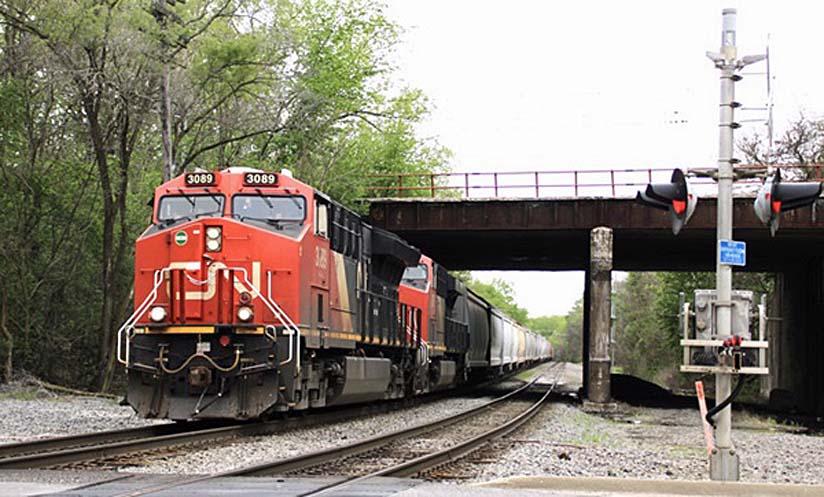

Barrington Illinois USA - The Chicago suburb of Barrington, which battled Canadian National's (CN) acquisition of the Elgin Joliet &
Eastern (EJ&E) in 2009 and has protested increased rail traffic ever since, has warned federal regulators that CN's proposed merger with Kansas City
Southern (KCS) would create "a traffic congestion nightmare for the people of the greater Chicagoland area."
The EJ&E is CN's Chicago bypass, connecting its former Wisconsin Central, Illinois Central, and Grand Trunk Western lines to create the only single line
route around North America's congested rail hub.
CN traffic in Barrington, northwest of Chicago, has risen from an average of 6.4 trains per day in 2009 to more than 18 as of 2016, the last full year of STB
oversight of the EJ&E merger impacts.
Barrington argues a CN/KCS combination would further increase rail traffic through the community, which aims to build an underpass to relieve grade crossing
congestion.
The KCS board is reviewing CN's unsolicited US$33.7 billion merger offer, which came about a month after KCS and Canadian Pacific (CP) announced their friendly
US$29 billion merger deal.
CP has received STB approval to put KCS into an independent voting trust while the merger is under review, and CN is seeking the same regulatory
approval.
"Based on the potential for severe negative impacts on the Village and other Chicagoland communities that are already struggling to cope with massive rail
freight volumes in the most congested rail choke point in the nation, it is imperative that the Board carefully assess the CN merger before green lighting it
for KCS shareholders with premature Trust approval," Barrington's lawyer, Richard Streeter, wrote in a 7 May 2021 letter to the STB.
Analysts say that if CN obtains approval to put KCS into a voting trust, it's likely that its offer will prevail over CP's in the battle for KCS.
CN has not provided details on how its acquisition of KCS might affect rail traffic in Chicago.
That's typical as railroads develop traffic projections as part of a formal merger application.
Based on preliminary talks with KCS, CN says forest products and propane traffic from Western Canada to destinations on KCS may increase.
But most of the traffic growth from a CN/KCS combination, officials have said, may be intermodal and automotive traffic linking Mexico and Texas with Detroit
and Eastern Canada, points that would not involve Barrington.
The town's lawyer also wrote that traffic moving between Western Canada and points on KCS would not touch the Chicago area in a merger between CP and
KCS.
"Without question, the proposed CN/KCS merger would have major implications for the region, impacted communities, and regional traffic flow,"
Streeter wrote.
"Because the approval of CN's Voting Trust motion may predetermine the outcome of the matter, the Board is urged not to make any premature decisions on
this matter absent robust analysis that can truly gauge if this merger would survive public interest scrutiny."
The board's public interest test for a voting trust, however, hinges on whether a dissolution of a merger agreement or a regulatory rejection of a merger would
compromise the railroads' financial and operational capabilities.
CP, which continues to publicize what it claims will be the negative impacts of a CN/KCS merger, has highlighted the Barrington filing in a series of social
media posts on both its Twitter and Facebook pages.
Bill Stephens.
(because there was no image with original article)
(usually because it's been seen before)
provisions in Section 29 of the Canadian
Copyright Modernization Act.
